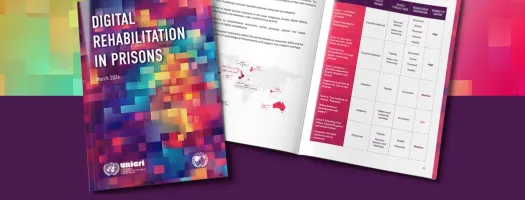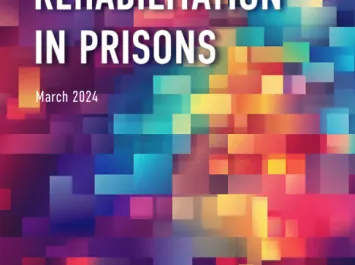This report examines the potential benefits and risks of introducing new technologies in prisons to facilitate prisoner rehabilitation.It aims to assist policymakers, practitioners, and those responsible for the design and delivery of rehabilitative programmes to understand how to leverage technologies to support prisoner rehabilitation effectively and ethically.
"Around the world, criminal justice systems are facing the challenge of rehabilitating prisoners effectively to reduce reoffending rates and create safer societies. Innovative digital technologies show promise in providing access to rehabilitation programmes and flexible, effective prison based interventions. However, the integration of technology requires a balance between digital and in-person modalities and a commitment to human rights and ethical considerations.
Since April 2023, UNICRI has been working on a research project with the support of the United Nations Asia and Far East Institute for the Prevention of Crime and the Treatment of Offenders (UNAFEI) and the Government of Japan to investigate the potential benefits of digital technologies for prisoner rehabilitation. This aligns with UNICRI’s strategic priorities to promote the rule of law, safeguard access to justice, and leverage new and emerging technologies to address crime.
The Nelson Mandela Rules emphasize the importance of providing prisoners with access to education, vocational training, work, and other assistance to facilitate their successful reintegration into society.
The recent global COVID-19 pandemic highlighted the challenges faced by prison administrators in delivering these services, increasing interest in the use of technology to address these issues.
Therefore, UNICRI is exploring the impact of innovative technologies on prisoner interventions to improve their effectiveness and support rehabilitation. Our research focuses on examining the use of technology within the prison environment and its impact on rehabilitation, with the aim of benefiting both prisoners and staff.
We believe that by carefully selecting appropriate technologies and implementing them ethically and with a human-centred approach, we can realize our shared vision of a more effective and rehabilitative criminal justice system. This approach aligns with our strategic priorities and embodies our shared aspirations for a future where technology serves as a cornerstone for enhancing the dignity, rights, and rehabilitation prospects of those within the criminal justice system."
Leif Villadsen Acting Director, UNICRI
Please click here to access the Report.



